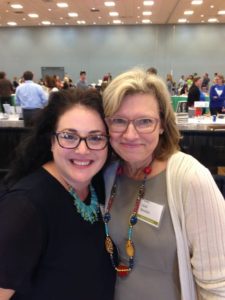
Lorin Oberweger, leader of Story 360 Writing Conference, and happy sttendee Debbie Burke
by Debbie Burke
The views from the top floor of the Centre Club in downtown Tampa, Florida were 360 degrees, vast and expansive. So was the content at the aptly named Story 360 Writing Conference I attended a couple of weekends ago. I came away almost dizzy from the talks by Christopher Vogler, Donald Maass, Janice Hardy, and other authors.
Don Maass is a respected agent, educator, and author of Writing the Breakout Novel, The Emotional Craft of Fiction, Writing 21st Century Fiction, plus numerous novels. His all-day master class on Friday, “Writing with Soul,” was packed with prompts and questions for writers to ask themselves. His style is not to present fiction writing techniques but rather to lead you up a ladder to the high diving board and push you off.
He reframed conflict, a typical requirement for stories, into provocation. Every line of dialogue is a provocation that requires a response. He said to a woman in the audience, “You look nice today,” to which she responded, “You want to get closer, take a better look?” That comeback brought down the house because it perfectly illustrated Don’s point.
He asked, “What event in your story provokes a response from your protagonist?” then offered possibilities: a compliment, an insult, a temptation, a dare, an embarrassment, a setback, a wound, a gift, etc.
Next, he asked, “What is your protagonist’s response to that provocation?” Beyond the primary responses of fight, flight, or freeze, he added diffuse, appease, dissent, ignore, judge, respond in kind, reach out in sympathy, walk away in disgust, or tell the world.
For the last choice, he described a guy in a NY Irish bar who is provoked and loudly announces to everyone there, “Did you hear what he said to me? Did you hear what that &%*$ said to me?”
The character’s response is what we as readers would like to do, not what we would actually do.
Don’s talk yielded 34 pages of hastily scribbled notes plus kept my mind spinning like a hamster in a wheel.
Thanks for a sleepless night, Don!
While talking with other attendees, I learned many of them are frequent flyers who’d taken Don’s classes previously and keep coming back. That says it all.
~~~
Side note: Several people had been to a conference years ago that featured the trifecta of Don, Chris Vogler, and TKZ’s own Jim Bell. I’d love to see those guys get the band back together again. Anyone else at TKZ in favor of a reunion concert?
~~~

Linda Hurtado Bond, Debbie Burke
On Saturday, I met Linda Hurtado Bond, an Emmy-winning 30-year veteran TV reporter in Tampa who’s also written six thrillers. Her latest book is All the Captive Girls set during Gasparilla, an annual Mardi Gras-style festival that celebrates pirates, drinking, pirate ships, drinking, pirate parades, drinking, pirate costumes…you get the idea.
She talked about how she had parlayed Gasparilla events into video promotions on her social media. Videos included her visit behind the scenes at the barn where parade floats are stored; a local bar/restaurant off the main drag that partnered with her to give visibility to both the business and her book; Linda’s Jeep decorated with lights driving in the parade while she, in a pirate costume, handed out beads to the crowd.
She acknowledges most introverted writers aren’t as extraverted as she is, nor do they have her recognizability from TV. Even so she advises authors to “Just be there” at community events because you never know what opportunities you might discover.
She recommends visiting bookstores, attending arts-related fairs, connecting with book clubs and book podcasters. To build your email list, do joint promotions with another author or a local business. Have something to offer—your expertise and willingness to answer questions; ARCs (advance reader copies); a book box with swag. As a breast cancer survivor, Linda participated in a fundraiser with her books as prizes.
Ask what you can do for the reader or audience. In other words, promotion is not about you, it’s about them and what they want, need, or enjoy.
I WANT to find out what high-octane vitamins Linda takes.
~~~

Sheree Greer and Debbie Burke
Sheree L. Greer is a Tampa-based author of fiction and creative nonfiction, as well as a business consultant, writing instructor, developmental editor, and new mom. She proudly showed phone photos of her bright-eyed, two-month-old little girl. She also admitted to new-baby exhaustion. However, not a trace of fatigue showed in Sheree’s vibrant presentation.
Sheree displayed a slide of two intersecting circles. One circle was want, the other was need. The oval where they overlapped was desire. Desire is the combination of wanting and needing something. She suggested a prompt to write about something you wanted or needed but didn’t get.
At age 35, Sheree’s need to stay sober intersected with her want to learn more about her past. That led to a desire to connect with her father. During their meeting he talked about his struggle with alcoholism. When she mentioned her age, he responded, “I was thirty-five when you were born.” At that moment, the common denominators of age and alcoholism linked them. She got to know herself through getting to know her father.
More prompts included creating a desire list for your character. Discover if the character shares her desires or hides them.
Three additional questions:
- At the start of your story, who knows about her desire?
- By the middle of your story, who knows about her desire?
- By the end, who knows about her desire?
Considering the character’s desire in that light was a fresh concept to me. It went beyond the usual questions about story stakes like what happens if a character fails, or what happens if they succeed?
Sheree also talked about interiority or the inner thoughts of a character. If a character is alone and thinking about themselves for too long, readers lose interest. Instead, she suggests focusing on the tension between the character’s inner wants/needs in contrast with the external happenings of the scene.
I DESIRE more insights like Sheree’s to lift my writing to the next level.
~~~

Janice Hardy, Sheree L. Greer, Debbie Burke, Eileen McIntyre
Janice Hardy runs Fiction University, an educational site she founded in 2009 that’s crammed with practical, actionable advice on writing. Her talk also focused on character’s wants and needs but from a different perspective. She says, “When want and need pull in opposite directions, the story gets interesting.”
She defines want as what the character thinks will make her happy; need is what will really make her happy. “Impossible desire” is the empty hole in a character’s soul.
When faced with a saggy middle, Janice suggests this is the place in the story to go deeper rather than wider. By wider, she means adding more activity. Deeper is where the author should force the character to make hard choices. Every choice must cause consequences in the plot.
The middle can feature false victories, where the character believes they’re making progress toward a goal but aren’t. Another possibility for the middle is false failure, where they believe they’ve failed but later discover the failure actually leads to success.
Janice recalled a conference when she experienced severe imposter syndrome. She was the unknown newbie on a panel with Lee Child and Maya Angelou. Janice understandably felt awkward and didn’t know what to say. Then those two luminaries admitted they also struggled with self-doubt at the start of each book. At that point, Janice realized self-doubt is normal for authors no matter how accomplished.
Janice is the author of a series of writing craft books. She’s also a meticulous, organized plotter, the polar opposite of my pantsing chaos.
I NEED to clean up my act, so I bought Janice’s book Planning Your Novel-Ideas and Structure.
~~~

Legends Christopher Vogler and Donald Maass
In the mid-1980s, Chris Vogler wrote a seven-page memo that famously blew through Hollywood like a Florida hurricane. The memo grew into the classic textbook for screenwriting and storytelling, The Writer’s Journey – Mythic Structure for Writers. The book has remained a perennial bestseller, including a 25th anniversary edition in 2020, and is still going strong.
Meeting Chris in person was the numero uno reason I attended the conference. My upcoming craft-of-writing book, The Villain’s Journey – How to Create Villains Readers Love to Hate, is the flip side to the Hero’s Journey which Chris explores in depth in The Writer’s Journey.
True confession time: Although Chris and I had previously exchanged friendly emails, I was intimidated about meeting him in person. During the lunch break, I even had to call a friend for support. She told me to get my sorry cowardly ass into the room and introduce myself.
Well…I did.
Chris was warm, friendly, down to earth, and not at all intimidating. We chatted about my book, and he could not have been more gracious, encouraging, and supportive.
In his Sunday presentation, Chris explained archetypes are stereotypes but deeper. He talked about impressions on cave walls made by prehistoric people who had a deep need to leave their mark, to say I had a life, I was here.
He showed a slide with two sets of ancient footprints that had been preserved under ash for thousands of years. One set was large and one small, probably a mother and child running through mud while fleeing a volcanic eruption. They had left their mark for a roomful of writers who, centuries later, were still moved by their plight.
That illustrated the universality and timeless power of stories.
Chris introduced us to a collection of lesser-known Greek gods, along with their family lineage. Each was the personification of a particular quality or theme.
One example was Arete. Her mother was the goddess of justice and her father the god of safety and security. Those qualities blended in Arete who embodied grace, virtue, excellence, and perfection. Arete’s evil twin sister was Cacia (Kakia) who embodied vice and immorality.
Chris then displayed a slide of a related myth. In the historic line drawing, young Hercules is shown at a crossroads where he encounters two beautiful women. “Cacia” points at the easy road going downhill toward quick material riches. “Arete” points at the other road which goes uphill through difficulties but ultimately leads to immortality by leaving a lasting mark on the world.
The character at a crossroads who must make a choice remains a relatable theme that today’s characters still face.
The goddess Themis (notice the similarity to “theme”) established the laws of the universe. Her daughter Dike laid out the laws of the world and human life—the moral code. Dike’s evil twin sister was Adikia, goddess of injustice and wrongdoing.
Today’s characters still face dilemmas of right and wrong.
Agon is the god of struggle. His name is also the root of the words “agony,” “protagonist,” and “antagonist.” Still relevant and relatable in today’s stories.
Chris presented more gods and goddesses, too many to include in this already-long post. At the end of his talk, I asked him if he was going to write a book based on his presentation. He smiled and said, “I already have.” The manuscript is near completion.
When it’s published, I NEED and WANT to read it.
~~~
One last shoutout to Lorin Oberweger and her team who brought together a 360-degree world of vision, talent, and knowledge. A big thank you for a fabulous, memorable conference! My head is still spinning.
~~~
TKZers, have you been to a conference that made a lasting impact on your writing? Please share that experience.
~~~

Please check out my upcoming book The Villain’s Journey-How to Create Villains Readers Love to Hate. Preorder now at this link and the ebook will be delivered to your device on July 13, 2025.













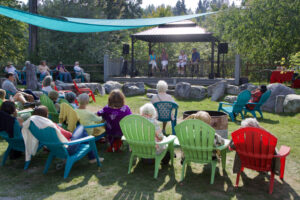
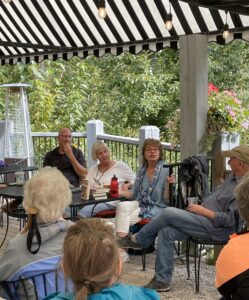 In the past, we had talked from the stage and needed sound equipment. Now we sat at chairs and tables in an area small enough that people could hear us without mics.
In the past, we had talked from the stage and needed sound equipment. Now we sat at chairs and tables in an area small enough that people could hear us without mics.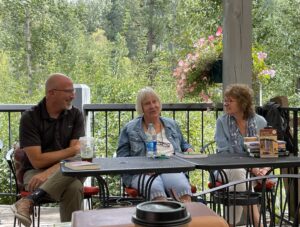



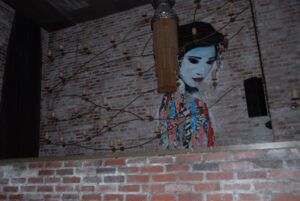
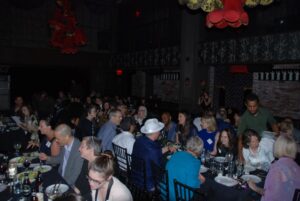
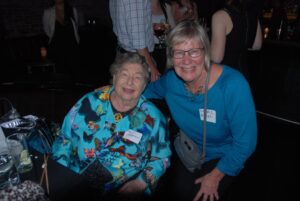
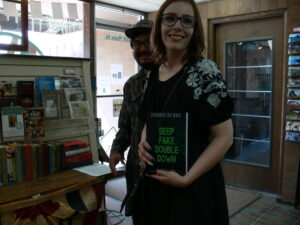
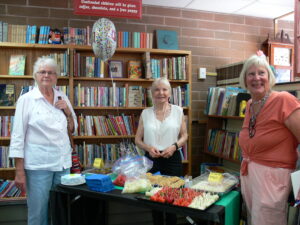
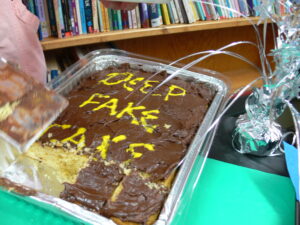
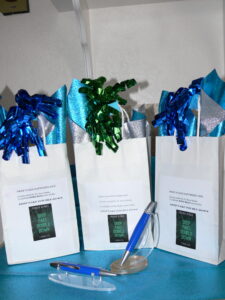
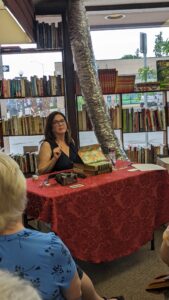
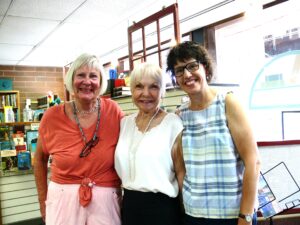
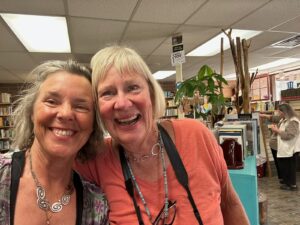
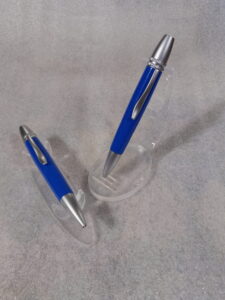

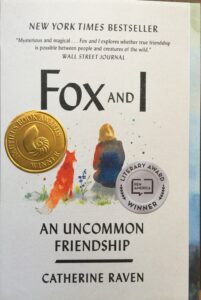 Despite many awards, stellar reviews, and glowing mentions in Time and People magazines, she’s suffering first-book jitters.
Despite many awards, stellar reviews, and glowing mentions in Time and People magazines, she’s suffering first-book jitters.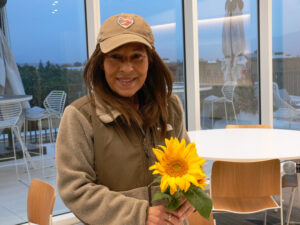

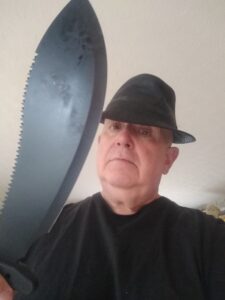
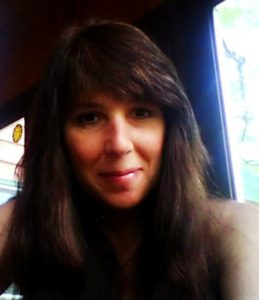





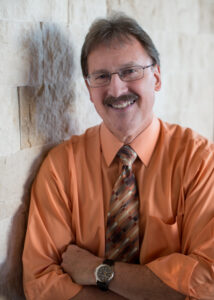
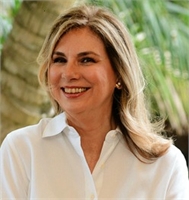
 P.J. Parrish (Kris Montee):
P.J. Parrish (Kris Montee): 
